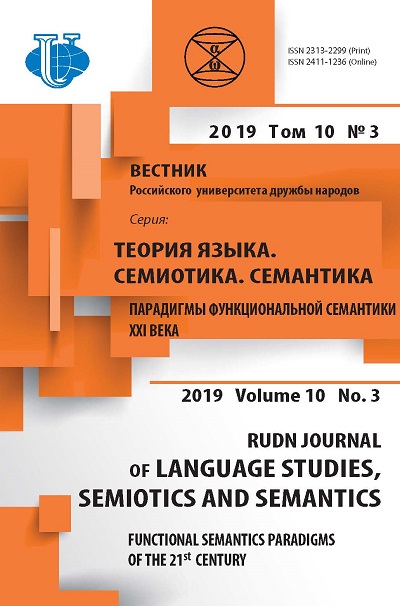Lexical Peculiarities of the Modern Spanish Language of Guatemala
- Authors: Kotenyatkina I.B1
-
Affiliations:
- Peoples’ Friendship University of Russia (RUDN University)
- Issue: Vol 10, No 3 (2019): Functional Semantics Paradigms of the 21st century
- Pages: 634-643
- Section: LEXICO-SEMANTIC TRANSFORMATIONS: FROM WORD TO TEXT ↔ FROM TEXT TO WORD
- URL: https://journals.rudn.ru/semiotics-semantics/article/view/22121
- DOI: https://doi.org/10.22363/2313-2299-2019-10-3-634-643
- ID: 22121
Cite item
Full Text
Abstract
Despite the fact that Russian linguists are actively exploring the peculiarities of the implementation of language means in Latin American countries, the Spanish language of Guatemala has not yet been the object of analysis in terms of the variation of lexical units. This article examines the lexical units used in the Guatemalan national variety of the Spanish language through the prism of modern lexical semantics, using the current common approaches and methods of the linguistics discipline. The peculiarities of the Guatemalan national variety of the Spanish language are demonstrated, such as: high-frequency common Spanish units that have undergone semantic changes; prevailing terms and idioms that are unusual for Spain; many innovations of both Guatemalan and Mexican origin are used; a large number of loanwords from indigenous languages; and diminutives are widely used. Finally, it is concluded that the revealed and studied peculiarities of the Spanish language of Guatemala determine the need to study it not only for developing philological knowledge but also, to a large extent, for meeting the practical needs of the modern society.
About the authors
Irina B Kotenyatkina
Peoples’ Friendship University of Russia (RUDN University)
Author for correspondence.
Email: kotenyatkina-ib@rudn.ru
PhD, Associate Professor of the Department of Foreign Languages of RUDN University
Moscow, RussiaReferences
- Shetemul, H. Chapinismos universales. URL: https://www.prensalibre.com/vida/escenario/ chapinismos-guatemaltiquismos-drae-idioma-espanol-0-1232876716/ (accessed: 12.12.20018).
- Real Academia Española, Asociación de Academias de la Lengua Española (2014) Diccionario de la Lengua Española. 23ª edición. Madrid: Espasa Calpe.
- Así surge el apelativo “chapín”. URL: https://www.prensalibre.com/hemeroteca/asi-surge-el-apelativo-chapin/ (accessed: 12.12.20018).
- Shumann Gálvez, O. (1987) Préstamos de náhuatl al. español hablado en el sur de Guatemala. In Anuario de Letras, vol. 25. México.
- Batres Jáuregui, A. (1892) Vicios del Lenguaje y Provincialismos de Guatemala: Estudio Filológico. Guatemala: Tipografía Nacional.
- Sandoval, L. (1941) Semántica Guatemalense o Diccionario de Guatemaltequismos. Guatemala: Tipografía Nacional.
- Armas, D. (1982) Diccionario de la Expresión Guatemalteca. Guatemala: Editorial Piedra Santa.
- Morales Pellecer, S. (2008) Diccionario de Guatemaltequismos. Guatemala: Argrafic.
- Pharies, D. (2002) Diccionario Etimológico de los sufijos españoles y de otros elementos finales. Madrid: Gredos.
- Chesnokova, O.S. (2004) Spanish in Latin America countries. Mexico. Moscow: RUDN. (In Russ.)
- Vasileva-Shvede, O.K. & Stepanov, G.V. (1972) Theoretical Spanish grammar. Morphology and syntax of parts of speech. Moscow: Vysshaya Shkola. (In Russ.)
- Molina M. del R. (2007) De los carajillos. URL: https://www.prensalibre.com/ (accessed: 12.12.20018).
Supplementary files












